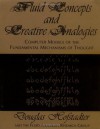251
Followers
4
Following
Manny Rayner's book reviews
I love reviewing books - have been doing it at Goodreads, but considering moving here.
Currently reading
The Greatest Show On Earth: The Evidence For Evolution
R in Action
Fluid Concepts and Creative Analogies
McGee on Food and Cooking: An Encyclopedia of Kitchen Science, History and Culture
Epistemic Dimensions of Personhood
Pattern Recognition and Machine Learning (Information Science and Statistics)
Relativity, Thermodynamics and Cosmology
The Cambridge Handbook of Second Language Acquisition
The Meaning of Relativity, Fifth Edition: Including the Relativistic Theory of the Non-Symmetric Field
 I will say at once that there was a great deal I did not understand in this book, which is based on four lectures Einstein gave at Princeton in 1921. Though short, it is very dense, and obviously written for people who know considerably more physics and mathematics than I do. But I had read enough about the content elsewhere to be able to follow the general outlines of the argument, and I will do my best to explain what I got out of it.
I will say at once that there was a great deal I did not understand in this book, which is based on four lectures Einstein gave at Princeton in 1921. Though short, it is very dense, and obviously written for people who know considerably more physics and mathematics than I do. But I had read enough about the content elsewhere to be able to follow the general outlines of the argument, and I will do my best to explain what I got out of it.Einstein's main goal is to show you how he arrived at the Theory of General Relativity. The basic idea is extraordinarily simple and logical: he wants to formulate the laws of nature in a way that is independent of the coordinate system chosen. This may sound modest, but it is not. In case you are in doubt, he invites you to consider the case of a rotating object like the Earth. In Newtonian physics, you have to use an "inertial" frame of reference, motionless or moving uniformly with respect to the fixed stars; then you can explain things like Foucault's pendulum.
But Einstein wants it also to be possible to adopt the Ptolemaic frame of reference, where the Earth stands still and the rest of the universe rotates around it. For Galileo and Newton, this would have made no sense at all, since space for them was absolute. Einstein shows that his great predecessors were wrong: you can have a consistent picture where these shifts are mathematically meaningful. If the Earth is standing still and the universe is rotating, the rotating gravitational field created by the distant stars will drag Foucalt's pendulum along with it. You need to identify gravity and acceleration, and model them both as curvature of space-time. It turns out (though the details are very complicated, and I couldn't follow them), that there is just one straightforward way to organize the scheme. This turns out to be the central tensor equation of General Relativity.
Having made this incredible discovery, you'd think Einstein would have been happy, but he wasn't. He felt he'd left things at best half-completed. His theory predicted singularities in what we would now call black holes (Einstein never believed in black holes, and hated them), and it had no elegant explanation for electromagnetic forces; they were just pasted on in an ugly and unsatisfying fashion. Einstein famously spent the second half of life in a fruitless search for a solution, and his frustration shines through. It is interesting to see how ruthless he is about discarding approaches which don't feel right. String theory wasn't even on the horizon yet, but this passage is remarkably prescient and I'm surprised I haven't see it quoted before:
I would have loved to watch him debate Susskind or Polchinski.More complex field theories have frequently been proposed. They may be classified according to the following characteristic features:
a) Increase of the number of dimensions of the continuum. In this case one must explain why the continuum is apparently restricted to four dimensions.
b) Introduction of fields of different kind (e.g. a vector field) in addition to the displacement field and its correlated tensor field gᵢⱼ.
c) Introduction of field equations of higher order (of differentiation)
In my view, such more complicated systems should be considered only if there are physical-empirical reasons to do so.
Einstein, Einstein, Einstein. Even if I only grasp a tenth of what you're telling me, you rock are an extraordinary person. I'm sorry you didn't wrap it all up the way you wanted to, but, you know, still pretty good for a mortal man.











